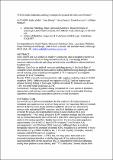Files in this item
Could molecular pathology testing in lung cancer be more cost effective?
Item metadata
| dc.contributor.author | Walsh, Kathy | |
| dc.contributor.author | Kheng, Yuan | |
| dc.contributor.author | Oniscu, Anca | |
| dc.contributor.author | Harrison, David James | |
| dc.contributor.author | Wallace, William | |
| dc.date.accessioned | 2016-07-25T14:30:06Z | |
| dc.date.available | 2016-07-25T14:30:06Z | |
| dc.date.issued | 2016-10 | |
| dc.identifier | 243385893 | |
| dc.identifier | 64c335e4-b428-4a12-b6c5-268b384d13a0 | |
| dc.identifier | 85027924318 | |
| dc.identifier | 000384681400018 | |
| dc.identifier.citation | Walsh , K , Kheng , Y , Oniscu , A , Harrison , D J & Wallace , W 2016 , ' Could molecular pathology testing in lung cancer be more cost effective? ' , Journal of Clinical Pathology , vol. 69 , no. 10 , pp. 938-941 . https://doi.org/10.1136/jclinpath-2016-203811 | en |
| dc.identifier.issn | 0021-9746 | |
| dc.identifier.other | ORCID: /0000-0001-9041-9988/work/64034209 | |
| dc.identifier.uri | https://hdl.handle.net/10023/9205 | |
| dc.description.abstract | Aims: EGFR and ALK analysis is routinely undertaken prior to targeted treatment of non-squamous non-small cell lung carcinoma (NSCLC). Increasingly limited resources require molecular pathology services to be cost effective without detriment to patient care. Methods: Data from an audit of molecular pathology testing in the South East of Scotland Cancer network has been used to explore different testing strategies with the aim of reducing costs; including investigation of TTF1 expression as a negative predictor for EGFR mutations. Results: TTF1 immunohistochemistry had a high negative predictive value for EGFR mutations (99%). Reflex testing all non-squamous NSCLC had the highest costs whereas limiting testing to those who might be considered for treatment would save 7.5%; the serial model could save 32.7%. Conclusions: Testing only patients being considered for EGFR and ALK inhibitors represented small savings; more significant savings would be achievable if testing algorithms utilized known associations between clinical biomarkers. | |
| dc.format.extent | 25636 | |
| dc.language.iso | eng | |
| dc.relation.ispartof | Journal of Clinical Pathology | en |
| dc.subject | RB Pathology | en |
| dc.subject | RM Therapeutics. Pharmacology | en |
| dc.subject | NDAS | en |
| dc.subject | SDG 3 - Good Health and Well-being | en |
| dc.subject.lcc | RB | en |
| dc.subject.lcc | RM | en |
| dc.title | Could molecular pathology testing in lung cancer be more cost effective? | en |
| dc.type | Journal article | en |
| dc.contributor.institution | University of St Andrews. School of Medicine | en |
| dc.identifier.doi | https://doi.org/10.1136/jclinpath-2016-203811 | |
| dc.description.status | Peer reviewed | en |
This item appears in the following Collection(s)
Items in the St Andrews Research Repository are protected by copyright, with all rights reserved, unless otherwise indicated.

